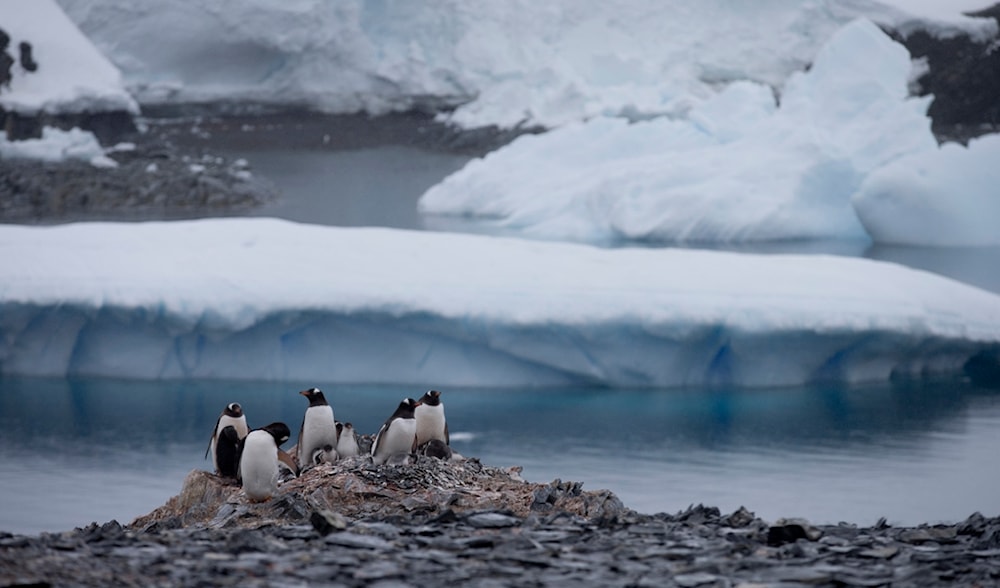Antarctic Ocean current could slow by 20%, worsening climate impacts
A study has found evidence of a “substantial reconfiguration of Southern Ocean dynamics,” with “far-reaching impacts on global climate patterns, oceanic heat distribution, and marine ecosystems.”
-

Gentoo penguins stand on rocks near the Chilean station Bernardo O'Higgins, Antarctica, on January 22, 2015. (AP)
A study led by Australian researchers warns that in a high-emissions scenario, the Antarctic Circumpolar Current—Earth’s strongest ocean current—could slow by 20% by 2050, worsening Antarctic ice melt and sea level rise.
This current, which connects the Atlantic, Pacific, and Indian Oceans, plays a key role in regulating heat and carbon dioxide in the ocean while keeping warm waters away from Antarctica.
The study found evidence of a "substantial reconfiguration of Southern Ocean dynamics," with "far-reaching impacts on global climate patterns, oceanic heat distribution, and marine ecosystems."
Co-author Assoc. Prof. Bishakhdatta Gayen from the University of Melbourne called the findings "quite alarming," explaining that as Antarctic ice melts, it releases cold, fresh water that spreads toward the equator, altering ocean density—a key factor in driving currents—and causing the slowdown.
Gayen warned that the ocean is a delicate system, saying that should this current "engine" fail, it could lead to increased climate extremes and faster global warming due to the ocean’s reduced ability to absorb carbon.
Experts warn of the hazards
Additionally, the slowdown could create a "vicious cycle," allowing more warm water to reach the Antarctic shelf, accelerating ice melt and further weakening the current, Dr. Taimoor Sohail, a co-author and climate scientist, warned.
He also noted that the disruption could impact ecosystems by altering ocean currents that help keep invasive species, like southern bull kelp, from reaching Antarctica. However, he emphasized that reducing carbon emissions could slow Antarctic ice loss and prevent the projected current slowdown.
Dr. Edward Doddridge, a physical oceanographer at the University of Tasmania who was not involved in the study, stressed the importance of understanding ocean currents, as over 90% of excess trapped heat is stored in the ocean and redistributed, influencing global climate and weather patterns.
Moreover, Monash University climate scientist Dr. Ariaan Purich, who is also not involved in the study, highlighted that Antarctic ocean changes are already happening. Antarctic ice is melting at an increasing rate, and since 2022, summer sea ice extent has consistently dropped below 2 million square kilometers for the first time in recorded history.
Purich further emphasized the need to monitor ocean heat and carbon absorption to improve climate projections and adaptation strategies, particularly for regions like Australia.
Wildfires more frequent
Although reduced carbon emissions could, to a certain extent, slow the consequences down, it is worth noting that wildfires have become frequent across the globe, spiking CO2 emissions to a historic high in 2024.
At Hawaii's Mauna Loa observatory, CO2 levels rose by 3.6 parts per million (ppm) to reach 427ppm, a stark contrast to the pre-industrial level of 280ppm before large-scale fossil fuel combustion initiated the climate crisis. The Mauna Loa observations, known as the Keeling Curve, have tracked CO2 levels since 1958, making them the longest-running direct measurements.
The sharp rise was caused by emissions from burning forests, which compounded record-high emissions from coal, oil, and gas in 2024. The El Niño climate phenomenon also contributed by creating hotter and drier tropical conditions. Scientists noted, however, that a record increase likely would have occurred even without El Niño.
Meanwhile, global average temperatures also hit a record high in 2024, exacerbating extreme heatwaves, storms, and floods that affected billions worldwide. This marked the first time the planet exceeded the 1.5°C (2.7°F) threshold agreed upon as a target under the Paris Climate Accord. UN Secretary-General Antonio Guterres criticized the fossil fuel industry, saying it was "pocketing profits while their products wreak havoc."

 4 Min Read
4 Min Read









